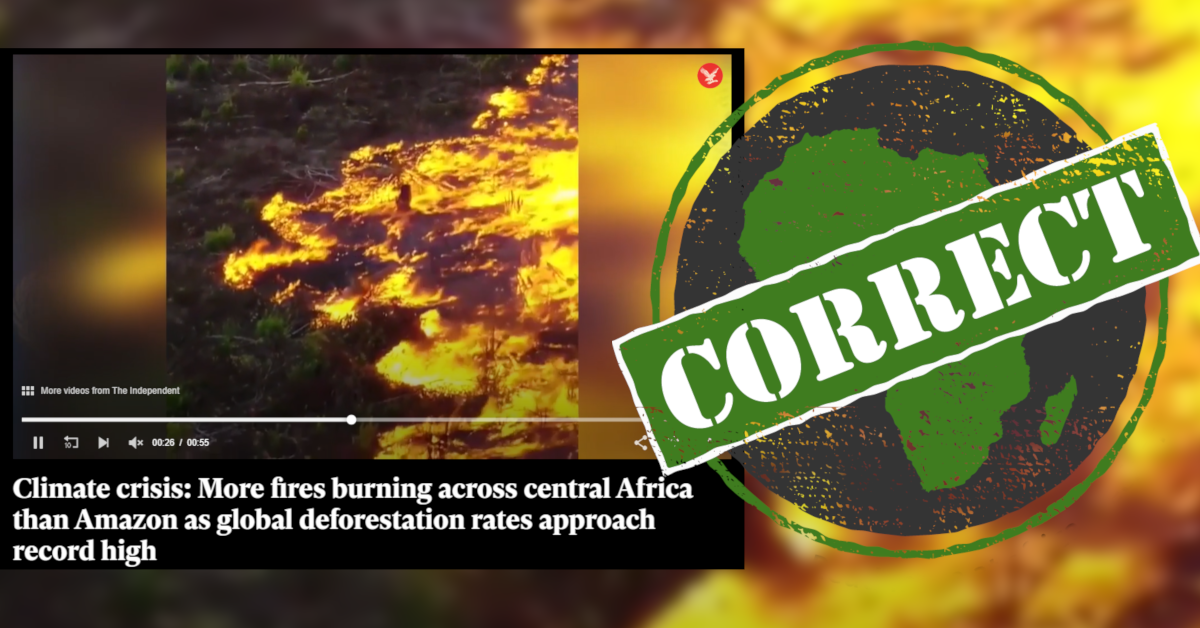An article published by the Independent, a UK newspaper, on 27 August 2019 claimed that while “focus has slowly grown on the fires ravaging the Amazon rainforest in Brazil, it has emerged an even greater number of fires are currently burning in central Africa”.
The article has been widely shared on Facebook, and flagged as potentially false by the platform’s fact-checking system. But the claim is true, and anyone can easily access the data behind it.

The Independent article quoted US agency Nasa’s Fire Information for Resource Management System, or Firms.
The system combines three different sets of data gathered by satellites orbiting Earth, to track fires in real time.
Each satellite records heat intensity at different points on the Earth’s surface and uses these to determine which areas contain active fires. It also picks up other hot spots like volcanoes.
These data points are then shared live to the Firms website, which members of the public can view. More importantly, anyone can request access to the full archive of Firms data, or use the tools on the Firms website to see what it looked like at a certain point in the past. This allows us to see for ourselves whether the Independent’s claims were true.
If we tell Firms to show data for the week leading up to 27 August we see that the number and density of recorded fires across areas like Angola and the Democratic Republic of Congo far outweigh those recorded in Brazil. This is just as the Independent article suggested.
Archived data also shows a higher number of fires reported leading up to the publishing of the article.
We have created this graph using archive data from the week leading up to 27 August. It shows that many more fires were raging in Angola, never mind the rest of central Africa, than in Brazil over the same period. The Independent article and headline were correct. – Keegan Leech
The article has been widely shared on Facebook, and flagged as potentially false by the platform’s fact-checking system. But the claim is true, and anyone can easily access the data behind it.

No smoke without fire
The Independent article quoted US agency Nasa’s Fire Information for Resource Management System, or Firms.
The system combines three different sets of data gathered by satellites orbiting Earth, to track fires in real time.
Each satellite records heat intensity at different points on the Earth’s surface and uses these to determine which areas contain active fires. It also picks up other hot spots like volcanoes.
These data points are then shared live to the Firms website, which members of the public can view. More importantly, anyone can request access to the full archive of Firms data, or use the tools on the Firms website to see what it looked like at a certain point in the past. This allows us to see for ourselves whether the Independent’s claims were true.
Same data reaches same conclusions as article
If we tell Firms to show data for the week leading up to 27 August we see that the number and density of recorded fires across areas like Angola and the Democratic Republic of Congo far outweigh those recorded in Brazil. This is just as the Independent article suggested.
Archived data also shows a higher number of fires reported leading up to the publishing of the article.
We have created this graph using archive data from the week leading up to 27 August. It shows that many more fires were raging in Angola, never mind the rest of central Africa, than in Brazil over the same period. The Independent article and headline were correct. – Keegan Leech
Republish our content for free
For publishers: what to do if your post is rated false
A fact-checker has rated your Facebook or Instagram post as “false”, “altered”, “partly false” or “missing context”. This could have serious consequences. What do you do?
Click on our guide for the steps you should follow.
Publishers guideAfrica Check teams up with Facebook
Africa Check is a partner in Meta's third-party fact-checking programme to help stop the spread of false information on social media.
The content we rate as “false” will be downgraded on Facebook and Instagram. This means fewer people will see it.
You can also help identify false information on Facebook. This guide explains how.


Add new comment